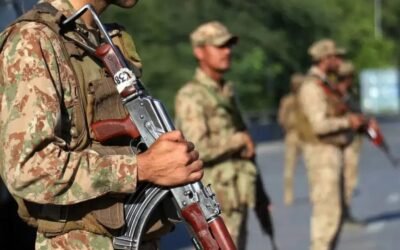For over two decades, Pakistan has grappled with the scourge of terrorism, yet its rule of law and legal machinery remain woefully inadequate in bringing perpetrators to justice. Investigations are often faulty and reliant on primitive methods, prosecutions lack vigor, and courts frequently acquit suspects on technical grounds. This weakness is compounded by the state’s inability to shield itself from those who openly challenge its authority. At the heart of the problem lies a fragile and fragmented legal framework, riddled with overlapping counter-terrorism laws, which hinders effective justice and fuels public disillusionment.
Conflicting Laws Create Legal Ambiguity
Pakistan’s counter-terrorism framework is riddled with contradictions that weaken both justice and enforcement. Under proposed legislation, judicial authorities would be empowered to issue warrants authorizing intelligence and law enforcement agencies to collect evidence before a crime occurs. Such evidence would be admissible in court, allowing proactive prevention rather than reactive investigation. This reform, long overdue, contrasts sharply with the current system, where police must wait for a crime to occur before registering an FIR and launching inquiries, creating dangerous delays.
Similarly, the 2011 Action (in Aid of Civil Power) Regulations empowered the state to detain insurgents during conflict, supported by Article 245 of the Constitution, which prevents courts from enforcing fundamental rights once the military is called in aid of civil power. Yet, in practice, the Khyber Pakhtunkhwa High Court entertained petitions challenging such detentions, exposing a striking legal inconsistency and undermining the credibility of the framework itself. Adding further complexity, the absence of clear laws to regulate conflict has incentivized extrajudicial measures. This is most evident in the alarming practice of police encounter killings, where frustrated officers eliminate suspects outside the courts, reflecting both institutional despair and public disillusionment with an ineffective legal system.
Judicial Weakness: Threats, Capacity Issues, and Procedural Bottlenecks
The weakness of Pakistan’s judicial system becomes starkly evident in cases like the Army Public School (APS) attack, the deadliest terrorist incident in the country’s history. Despite over 150 children being martyred, parents of the victims, such as Advocate Fazal Khan, father of Omer Khan, were denied the basic right of recording witness statements. Even though survivors and eyewitnesses like Naveed Akhter were present at the scene, their testimonies were ignored, and repeated requests for transparency, judicial inquiry, or access to investigation details under the Right to Information Act were dismissed as “sensitive matters.” This lack of accountability deepens public mistrust in the system.
Compounding these weaknesses, the reliance on military courts has created further complexities. Petitioners like Azal Wadud and others convicted by military tribunals argued that they were denied the benefit of Section 382-B of the Criminal Procedure Code, which requires courts to deduct pre-trial detention from total imprisonment. Many had already spent years, sometimes more than their imposed sentence, awaiting trial, yet military courts excluded these considerations. Such practices highlight procedural bottlenecks, limited judicial oversight, and a disregard for due process, ultimately eroding the credibility of counter-terrorism justice while perpetuating the perception of arbitrariness in Pakistan’s legal framework.
In 2019, the Peshawar High Court exposed further flaws by acquitting nearly 200 individuals convicted by military courts, ruling that trials lacked credible evidence, violated due process, and denied the accused the right to counsel of choice. These failures reveal not only procedural bottlenecks and weak capacity but also a culture of intimidation and neglect that continues to erode confidence in Pakistan’s justice system.
You May Like To Read: The Anti-Polio Jihad: Exposing FAK’s Deliberate Campaign Against Public Health Initiatives
Consequences: Low Convictions and Eroding Public Trust
The persistent weakness of Pakistan’s justice system is most evident in its dismal conviction rates, which have shattered public trust in the judiciary. PPP Vice-President Sherry Rehman, citing a report by the Sustainable Social Development Organisation, highlighted that in 2024 alone, over 32,000 cases of rape, kidnapping, domestic violence, and so-called honour killings were reported, yet conviction rates remained alarmingly low: less than 0.5 percent for rape and honour killings, 0.1 percent for kidnapping, and 1.3 percent for domestic violence. This culture of impunity extends to terrorism cases as well.
A government-backed study under the Action to Counter Terrorism project reviewed 20 cases in Khyber Pakhtunkhwa and found conviction rates in anti-terrorism courts to be only 28 percent in 2016, with acquittals in more than half the cases. Much of this failure stems from weak investigations: poorly trained police officers, often with minimal qualifications, lack the tools to collect forensic evidence or build credible cases. As a result, terrorists and criminals alike often walk free, leaving victims disillusioned and society skeptical of the state’s ability to deliver justice.
Conclusion
Pakistan’s counter-terrorism framework illustrates how conflicting laws, judicial weaknesses, and flawed investigations create a vicious cycle of low convictions and public disillusionment. From the denial of victims’ voices in the APS case to the unconstitutional practices of military courts and the alarming acquittal rates in anti-terrorism trials, the justice system consistently falls short. These systemic failures foster a dangerous culture of impunity, undermining state authority and public confidence. To break this cycle, immediate and far-reaching reforms in the judiciary are essential, strengthening investigations, ensuring fair trials, and harmonizing laws to deliver justice that is both effective and credible.
You May Like To Read: The ‘Soft Power’ of Destabilization: How Indian Media, and Cultural Outlets Incite Discontent in Balochistan




























